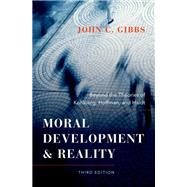Moral Development and Reality explores the nature of moral development, human behavior, and social interconnections. The exploration elucidates the full range of moral development, from superficial perception to a deeper understanding and feeling through social perspective-taking. By comparing, contrasting, and going beyond the key theories of preeminent thinkers Lawrence Kohlberg, Martin Hoffman, and Jonathan Haidt, author John C. Gibbs tackles vital questions: What exactly is morality and its development? Can the key theoretical perspectives be integrated? What accounts for prosocial behavior, and how can we understand and treat antisocial behavior? Does moral development, including moments of moral inspiration, reflect a deeper reality?
This third edition of Moral Development and Reality is thoroughly updated, refined, and expanded. A major addition to this volume is the attention to the work of Jonathan Haidt, a prominent theorist who studies the psychological bases of morality across cultures and political ideologies. Gibbs is authoritative with respect to Kohlberg's, Hoffman's, and Haidt's theories, thanks in good measure to his privileged position, having worked or been acquainted with all three of these key figures for decades. A new foreword by David Moshman introduces the third edition, calling it "the most important contribution to the study of moral development since the turn of the century." Moral Development and Reality will have broad appeal across academic and applied disciplines, especially education and the helping professions. With its case studies and chapter questions, it also serves as a text in advanced undergraduate and graduate courses in social/developmental psychology and human development.








